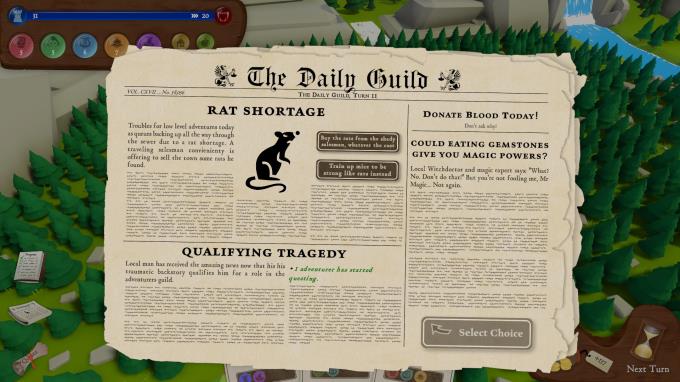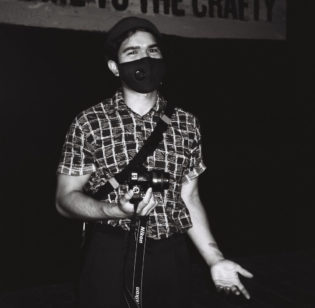Fantasy Town Regional Manager, or FTRM, is Caps Collective’s first game that was released to PC earlier in November. Caps Collective is a small dev team based out of Sydney, Australia, and FTRM is a culmination of what was once a university project, requiring the team of developers with varied interests to find a way for their ideas to mesh together.
The game is a heavily community-oriented project, with the developers staying very active in the game’s Discord. Their aim is to interact with players frequently, allowing passionate players to be involved in the project themselves. A big thank you to Ben from Caps Collective who was all too eager to talk to me about how the game had come together.
“Our team had a lot of varying ideas and interest areas for systems and features with the early project being finding ways to fit these all together and form a cohesive whole.”
“The various parts… seem like disparate elements, but in FTRM they manage a strange synergy.”
The developers describe FTRM as a genre-bending card-based, rogue-lite, town builder. Personally, it feels very much like a puzzle game.
FTRM has you taking charge of a fledgling town in the middle of nowhere and trying to make it flourish, which in the context of the game means attracting enough adventurers to handle the threats of living in the wilderness. Turn by turn, you are given a hand of three cards to try and decide what to spend on to ensure your town’s survival. There’s an absurdity to trying to bend over backwards to try to satisfy your townsfolk who may disproportionally come from a particular class.
From one playthrough to the next, you might find yourself scrambling to fill your town with blacksmiths to meet the demands of the twelve brawlers who’ve decided to live there, or avoiding taverns lest you piss off the vocal population of diviners that find them distasteful. You also have to manage the space the town occupies. There’s a finite amount of space, and buildings occupy various different shapes, the outcome is a sort of Tetris-like mini-game where you also need to decide on whether or not to spend gold on clearing trees and ruins.
The various parts—the cards, the builder-style town designing, the random events—seem like disparate elements, but in FTRM they manage a strange synergy.

“Before FTRM, we had to practice with smaller game jam projects to quickly iterate on ideas with the goal to ‘yes and’ an idea by adding an element… features get refined or replaced in a kind of natural selection.”
Despite the genre amalgamation, the game is easy to play. The developer’s intention for the game to feel lite and accessible is evident, and it’s not a particularly complicated game to get a handle of.
The graphical style is reminiscent of early Runescape, and the music is an upbeat string melody that’s occasionally supported by what I can only really describe as bardic trap music. The theming is fantastical and the tone is light-hearted. Every turn you’re treated to a newspaper page that details the latest developments in your town, whether that means adventurers have joined or the threat towards your town has risen. The writing is always whimsical and often funny.
Despite the game’s accessible nature and light-hearted approach, it still finds a way to be strangely difficult, sometimes frustratingly so.

“One thing we realised was there was a bit of divide between the people who enjoyed the game for the theming and interactions, and others who enjoyed the heavier strategy.”
In our chat, Ben acknowledged the shortcomings of strategy games that front-load a lot of mechanics and create a daunting experience for the player. I appreciate that understanding, but it has to be said that during my time with the game, it felt as though the ‘simple’ system that was in place was a little too opaque at times, and a little too un-strategic.
The front-loading of mechanics can be overwhelming in other strategy titles, but the lack of effective levers to pull in the face of challenges, or even failure, can at times make FTRM feel vexing.
In one game on turn 5, my measly population was struck down by a mix of vampire hunters (who had mistaken some cosplaying villagers for real vampires) and nearby marauders (who were attacking just for the sake of it). I lost four villagers to the two events, and my threat level raised two points. Next turn, some mimics appeared nearby and my threat level rose by another three points, while only one new adventurer joined my town. Next turn the threat rose by five, and no new adventurers joined.
Unfortunately, this roulette of the cards and the random events, which is initially enticing, begins to grow tiresome when some runs feel particularly impossible.
“An overarching goal of Caps Collective is to demystify the game making process and be as transparent as we can about our process.”
Despite any criticisms I may have for the game, there’s a charming appeal that’s hard to shake. There’s a cobbling together of things that probably shouldn’t work together, but somehow do. And it’s this feeling that has me hopeful that FTRM will continue to grow and adjust within the specific niche it occupies.
“We’ve developed this… agile, feedback-driven mindset, so playtesting was always a driver of ideas and features, and that’s only gotten stronger since release. An overarching goal of Caps Collective is to demystify the game making process and be as transparent as we can about our process.”
The forthright attitude of the developers and their willingness to involve the community deeply helps to grow trust. It’s also fantastic to see their fresh approach to designing within (or without) gaming genres that tells me that this project, or any future Caps Collective titles, will at the very least be interesting.
Besides, there’s something undeniably wonderful in experiencing something that’s made for the fun of it.
Fantasy Town Regional Manager can be found on Steam for those intrigued, or you can simply follow Caps Collective on Twitter to keep up with their developments!





